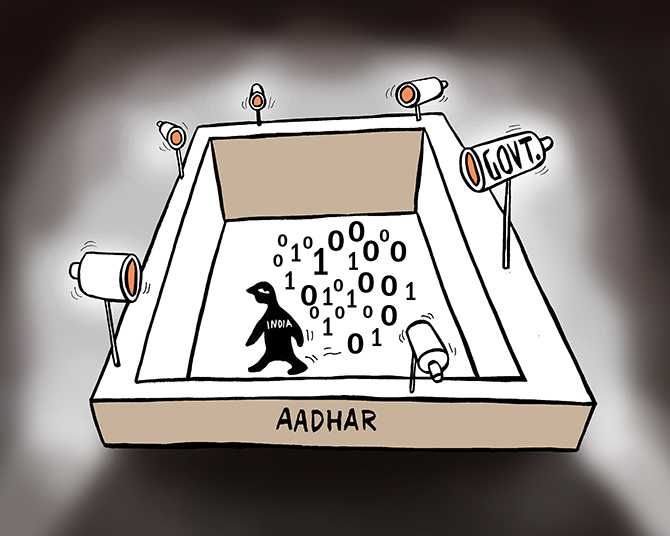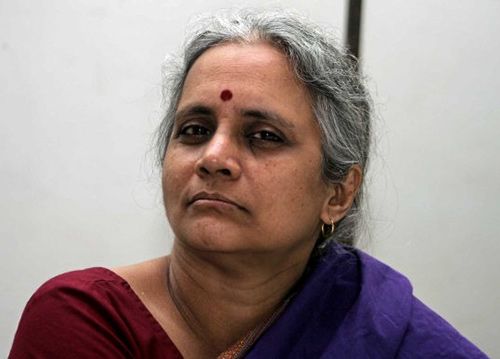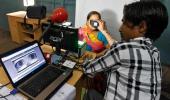'The government that is talking all the time about national security and national interests should be concerned.'
'When national interests are jeopardised by their own project, they should pause and listen.'
'Whether it is the BJP or the Congress, they all want control over the people.'
'They don't give a damn if anything happens to the people of the country; they are only interested in what they can get out of the data.'
Illustration: Uttam Ghosh/Rediff.com

Dr Usha Ramanathan, an independent legal researcher, has been writing, campaigning and debating the social, legal and economic aspects of the Aadhar card project from 2009 onwards.
Dr Ramanathan, below, left, tells Rediff.com's Shobha Warrier why Aadhar is not going to help India or its people in any way, rather how it is a security threat.
You have been a strong critic of the Aadhar card from the time it was introduced by the Manmohan Singh government. The way the Narendra Modi government is making it an all-encompassing identity card, do the people of India have to be worried?
You have to remember that this is not just a project of the government; it is a project of corporate interests which is working with and through the government.
Increasingly, it has become clear that this isn't just about India, the Indian government and the Indian State.
We now know that the curiosity of the American establishment is very high in what is happening in various parts of the world.
We also know that with the kind of economic development that is happening, there are many countries that are interested in India, interested in the various kinds of data points which would help them decide where they want to intervene and where they don't want to.
From what's happening around the world, we know that the curiosity is more than we can tolerate.
We also know that the UPA (Dr Singh's United Progressive Alliance) government wanted us to believe that they were at least dealing with terrorism.
We have been saying from the beginning that when you are creating a data base of this kind of the entire population, it is a national security threat.
I don't understand how the government does not see it.
We had breaches happening to data bases all over the place.
The craziness of the data base is that they say you put the number in every data base, which is what the corporates want.
They want to make data out of all of us.
They are asking us to put three numbers everywhere: Bank account number, UID number and mobile number.
These are the ways you identify yourself in various places and now you make that completely insecure because it's all over the place.
Now they want to put biometrics also everywhere. So, it's a system without a system.
Nandan Nilekani, then the chairman of the Unique Identity Authority of India, had said it was an identity platform, but now it has become an identity itself...
It was never meant to be an identity. It was meant to be an identity platform and he doesn't care what happens to the identity of the person.
He just wants numbers that can track various kinds of data which they are interested in.
That's why Nilekani says privacy is not an issue, surveillance is not an issue, and India, from being a data poor country is becoming a data rich country.
What he says will happen because everybody will have to leave their digital footprints in different places for different service providers, and that's his plan.
His is a complete corporate plan where data is the new oil and he wants to be in total control of the whole pipeline of the data.
When Aadhar was first introduced Nilekani had said that biometric data would not be given to anybody. Now, even a private telephone company is using the same biometrics to identify you.
How dangerous is it going to be?
First of all, you have to understand that Nilekani has been misinforming throughout.
For instance, he says UIDAI does not give biometric information as it does not have much information, so it's not unsafe.
Yes, UIDAI might not give biometric information, but in the process of accessing their authentication service, they are handing over to people whatever is in their data base.
Now they are using biometrics to be the authenticator by all kinds of people which means you have no control over it.
There is no monitoring system to verify that they are not retaining the biometric, there is no monitoring system to ensure that the consent is being got. Nothing.
The only conclusion I can draw is that they don't give a damn if anything happens to the people of the country; they are only interested in what they can get out of the data.
Is it necessary for every citizen of a country to have a unique ID number?
If you look at the various uses for which they are going to put it, we see two kinds of users.
One is, private companies want to use it so that they KYC will become simpler.
By creating such a data base with so much resources, putting all people at risk so that your KYC becomes simpler is completely disproportionate to my mind.
Then they say the government will be able to deliver services, but if you see, so far they have used it only to cut people out of services and not to deliver services.
If you look at all the notifications that are coming now, it is impossible to understand what possible purpose there can be.
For example, if you are going to have a toilet in your house and they are going to give money for that, you have to give your UID number before you get the money.
If you are a Bhopal gas victim from 1984 and for rehabilitation, today you have to give your UID number, or else, you get dis-entitled for rehabilitation.
If you are a woman rescued from prostitution and rehabilitated, they ask her to give her UID number which is completely contradictory because the first thing such a rehabilitation needs is anonymity.
When a manual scavenger is rehabilitated, he doesn't want to carry the identity with him. But it appears nobody cares.
They only want you to have a UID number and put it on every data base.
It's one way of coercing people to enrol for this. That's contrary to the orders of the court, but it appears the government doesn't give a damn what the court is saying or anybody's saying or what even their own lawyers are saying.
Even the law says only two kinds of use is possible; one is authentication which means you give a fingerprint, but nobody can retain the data but that's not what is happening.
Are they going to give information to an employer what a child went through on his way to adulthood?'
The second thing is, they have added e-KYC, an app created on the platform to give information which is against what they said when it was created.
The most important thing is, they are asking us to put the number in every database.
Show me the provision in the law that allows them to do so.
The law says you cannot retain the information. They don't have a provision which says you can ask for the number anywhere.
Actually it is contrary to the law the government itself has made in a hurried way calling it a Money Bill.
Forget about the court, they are breaking their own law.

Is it not in a way intruding into the lives of people?
Obviously. If you are a Bhopal gas victim, or a prostitute or a manual scavenger, you are able to track them and this is something that intrudes into the lives of people.
The HRD ministry said they are going to put the UID number with the school from the time the child enters school till he leaves.
Sociologically this is the age they pass through many conflicts and problems in life and emerge into adulthood.
Now, they are saying they would add the number to everything.
The HRD ministry says they can give the data (of children) to employers later. Are they going to give information to an employer what a child went through on his way to adulthood? Who is this employer?
Like you said earlier, is it like the corporates and the market matter more than the individuals?
For people like Nilekani, they are only interested in the market as they want to have more start-ups and they want to outsource. This is the only agenda they know.
For the government, they have found a convenient tool to put people under surveillance and tracking people across time and activities.
Why is the Bill Gates Foundation coming and sitting with the RBI every day asking them to make everything cashless?
And they have not tested any of these systems and wherever they have tested, the system has failed. But they are refusing to say what the tests have shown.
To me, there seems to be concerted plan to attack our various systems and one of the central systems is the monetary system.
We see a lot of irresponsibility here.
Nilekani and his people create whatever apps they want and they say they evangelise them to the government.
The government is not listening to other people, calling us anti-UIDAI.
This is not about anti-UIDAI; this is a stupid system.
In 2010, we had said, please pause before you carry on. Get the feasibility report done as this is what we anticipate.
Now what we had anticipated has happened; coercion, illegality and exclusion.
When you give it to companies of all kinds, it becomes a national security threat too.
The government that is talking all the time about national security and national interests should be concerned.
Who is Paytm? Why do we have to reveal everything, all our financial transactions to Paytm?
The idea that people are irrelevant and relevant only as data points will lead us down to very dangerous paths.
How is it useful for the government to expose every single person?
What does the government want?
If the government wants to administer, this is not the way to do it.
If the government wants to track and profile people, this can, to quite an extent, be a good surveillance.
But the government has to be concerned about national security and national interests.
When national interests are jeopardised by their own project, they should pause and listen.
You have created multiple electronic data bases now. Do you think other countries are not going to dig into this? How can they be so naïve?
They said UIDAI numbers were issued to 80 crore people and 8 crore enrolments were rejected, which is 10 per cent of the enrolment.
When we asked why they were rejected, they said there were duplicates. But they do not know how many were duplicates and for what other reasons they were rejected.
They were not bothered to go back and check.
'In the US, the social security number is linked to social security, but here this ID is linked to all and sundry; from the mid-day meal scheme to everything.'
You ask the biometric experts, they would say it won't take much time to create fake numbers. The enrolment is done by some agency, not even monitored well.
Creating multiple fake identities is so easy in this process.
What is the value of something when 30 per cent people in Rajasthan cannot get ration because their fingerprints are not there?
I can understand Nilekani being irresponsible because for him, he only wants to control this as it is a corporate interest. But how can the government be doing this?
The supporters of the unique number say that in countries like the US, there is a unique ID number for everyone and they ask, why is it that in India people want to criticise it...
First of all, what the US has is a social security number and there is no comparison between the US social security number and this (the way the government want to use the Aadhar ID).
In the US, the social security number is linked to social security, but here this ID is linked to all and sundry; from the mid-day meal scheme to everything.
Here, the State is saying, 'if I give you something, if I pay you a salary, you are the beneficiary of the State, and therefore, you have to be subservient to the State.'
It's demeaning for a population.
In the US, they will allow it to be used only for limited purposes and they advise you not to use it everywhere.
They have the privacy law, the non-discrimination law and they have a system by which you can complain if you have a problem. And it's not based on biometrics.
Now that the government plans to connect all the details of a person like income tax, driving license, etc to the Aadhar card, do you feel it's going to be like Big Brother watching us all?
Obviously. What does the government say? All of you are corrupt unless you prove otherwise.
They even say they will cancel you PAN card if you don't have an Aadhar card. How absurd is that?
That is the biggest threat to the democracy you can have.'
If you look at the past 15 years, where have all the scams happened? Within the government and between the governments and corporates. But they want to check us and see whether we are corrupt or not.
This has nothing to do with corruption, efficiency, inclusiveness, etc. All these myths are busted by now.
Why do you have a Constitution?
Because you want to recognise your rights and you want the State to be restrained.
It's not about making the State all powerful; it's about controlling the power of the State.
Now the State says, I am above the law and I will do whatever I want.
If you want to be recognised as a human being in this territory, you better do what I ask you to do.
They have the power to disable and omit any number.
The Manmohan Singh government started it with the intention of cutting down on subsidies because the World Bank was asking them to cut it down to the maximum.
This government which in Opposition wanted the project to be dropped because it was insecure, is going on with it.
'If the court abandons that role, people will have to find other means which is not a good thing.'
They said the first thing they would do when they come to power would be to scrap the project.
After they came to power, they want power over people.
It's tragic that two governments that follow different ideologies, are doing the same.
This is like keeping the RTI upside down.
RTI was about the State visible to people, but this is about making people visible to the State.
There is an ambition in the government that everyone should be in every data base to be completely visible to the State.
That is the biggest threat to the democracy you can have.
That is Big Brother watching...
Yes, Big Brother watching.
The State has the power and not the people.
People have to worry about the State having too much power.
This is a clear case of moving towards absolute power with the State.
The State wants each individual to come and prove at regular intervals that s/he is not corrupt.
It is like, I as the State need to see you whenever I want to.
When in power, whether it is the BJP or the Congress, they all want control over the people.
It is the job of the court to see that they don't get the control over people.
Because this is not an anarchic country; the government is taking advantage of it.
The court also has to realise that the State is not the protector of civil liberties; it is the court.
Our fundamental rights are not protected by the State, but by the court.
The court has to understand that people depend upon the court to protect them from the absolute power of the State.
If the court abandons that role, people will have to find other means which is not a good thing.









